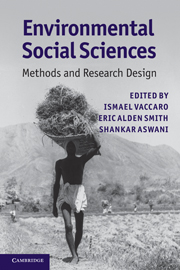Book contents
- Frontmatter
- Contents
- Contributors
- Foreword
- Preface
- 1 Introduction
- 2 People, numbers, and natural resources: demography in environmental research
- 3 Production decisions and time allocation: a guide to data collection
- 4 Analyzing the politics of natural resources: from theories of property rights to institutional analysis and beyond
- 5 Extreme events, tipping points, and vulnerability: methods in the political economy of environment
- 6 Local communities and natural resources: ethnobiology in practice
- 7 Mapping histories: cultural landscapes and walkabout methods
- 8 Metaphors and myths in news reports of an Amazonian “Lost Tribe”: society, environment and literary analysis
- 9 Water decision-makers in a desert city: text analysis and environmental social science
- 10 Linking human and natural systems: social networks, environment, and ecology
- 11 Khat commodity chains in Madagascar: multi-sited ethnography at multiple scales
- 12 Spatiotemporal methodologies in environmental anthropology: geographic information systems, remote sensing, landscape changes, and local knowledge
- 13 Deep time, diachronic change, and the integration of multi-scalar data: archaeological methods for exploring human–environment dynamics
- 14 Comparing trajectories of climate, class, and production: an historical ecology of American yeomen
- 15 Socioecological methods for designing marine conservation programs: a Solomon Islands example
- Index
- References
5 - Extreme events, tipping points, and vulnerability: methods in the political economy of environment
Published online by Cambridge University Press: 05 June 2012
- Frontmatter
- Contents
- Contributors
- Foreword
- Preface
- 1 Introduction
- 2 People, numbers, and natural resources: demography in environmental research
- 3 Production decisions and time allocation: a guide to data collection
- 4 Analyzing the politics of natural resources: from theories of property rights to institutional analysis and beyond
- 5 Extreme events, tipping points, and vulnerability: methods in the political economy of environment
- 6 Local communities and natural resources: ethnobiology in practice
- 7 Mapping histories: cultural landscapes and walkabout methods
- 8 Metaphors and myths in news reports of an Amazonian “Lost Tribe”: society, environment and literary analysis
- 9 Water decision-makers in a desert city: text analysis and environmental social science
- 10 Linking human and natural systems: social networks, environment, and ecology
- 11 Khat commodity chains in Madagascar: multi-sited ethnography at multiple scales
- 12 Spatiotemporal methodologies in environmental anthropology: geographic information systems, remote sensing, landscape changes, and local knowledge
- 13 Deep time, diachronic change, and the integration of multi-scalar data: archaeological methods for exploring human–environment dynamics
- 14 Comparing trajectories of climate, class, and production: an historical ecology of American yeomen
- 15 Socioecological methods for designing marine conservation programs: a Solomon Islands example
- Index
- References
Summary
Introduction
Integrating economic and political perspectives for the purposes of understanding daily life in human ecosystems produces particular methodological challenges for researchers. Many levels of analysis (e.g., individual, group, and other levels of social organization) and many units of analysis (e.g., behaviors, strategies, linguistic status/rank markers) may be present in any given study, and standard procedures for examining the political economy of environment are not common. Ecological economics provides a number of standardized analytical approaches, but does not typically address the daily life of individuals, households, and communities, nor does it try to understand “why societies are the way they are” in ecological contexts. “Why societies are the way they are” (whether at micro or macro levels) requires adding the analysis of power; thus, I wanted to conceive of this anthropological approach to economy and ecology as the political economy of environment.
For our purposes, the term political economy is intended to conceptualize how human populations create social order through economic production, political prestige, and ideology (Blanton et al. 1996). More specifically, it is largely a top-down approach that assumes that elites generally attempt to maintain power at any level of political organization. To do so, they focus on some aspect of economic production for which they can control scarcity and value through taxation, storage, access, or production. Often this scarcity involves environmental inputs, such as the mining of precious stones or the storage of grain. Accompanying this economic focus should be a coherent mode of garnering prestige such as via foreign dignitaries or via access to the divine by a god-king. This prestige assures processes of political continuity (e.g., continued recognition by foreign powers of a state’s leaders even if they change). Finally, there will also exist a common or dominant ideology that indicates where allegiance and devotion should be directed, such as the tribal focus on kin or a state’s focus on gods. These practices are integrated into the daily life of commoners and are also reversely shaped by them. This allegiance helps structure access to productive resources, such as land and other natural resources.
- Type
- Chapter
- Information
- Environmental Social SciencesMethods and Research Design, pp. 80 - 109Publisher: Cambridge University PressPrint publication year: 2010
References
- 1
- Cited by



